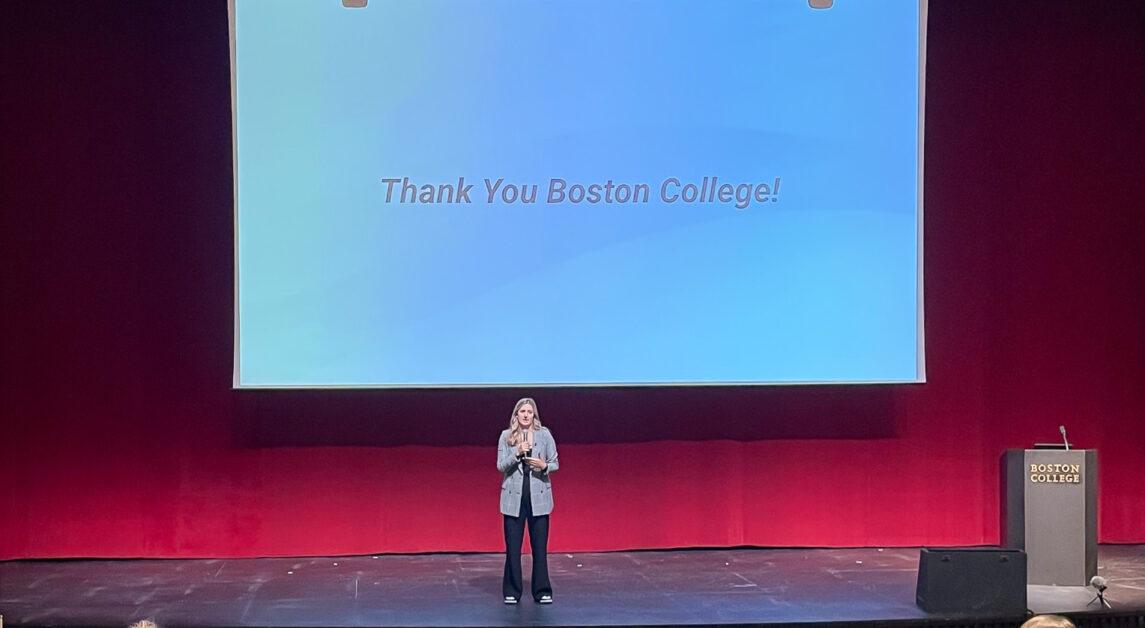As Browne began to speak, complete silence fell over the crowd.
“No matter what arena of life you compete in—if you are an artist, a musician, if you’re pre-med, if you’re going to go into the business world—those are environments and arenas where we can feel stress and we can feel pressure,” Browne said. “And pressure is something that led to a crisis that ultimately changed my life.”
Browne, a former Division 1 volleyball player for the University of Southern California (USC), is now a mental health advocate, host of the podcast Real Pod, and founder of The Hidden Opponent—a mental health advocacy group for student-athletes. Her work focuses on destigmatizing conversations about anxiety, depression, food insecurity, and other mental health disorders, especially among student-athletes.
Browne spoke at a talk co-sponsored by UGBC and the Student-Athlete Advisory Committee (SAAC) at Boston College on Monday, sharing her story as a college athlete struggling with mental health battles that, once, she could not even name.
As a freshman walk-on volleyball player at USC, “freshman-Victoria” was living her dream. Surrounded by teammates and coaches she had idolized for years, Browne said the first few weeks on campus felt surreal. Then the pressure started to build.
“It just kept piling and piling and piling, until one particular moment,” Browne said. “I remember this moment vividly. And I think it happens to all of us in different ways. It’s that moment in your life when things shift from blissful ignorance to overwhelming awareness.”
Browne said in one volleyball practice exercise, she was supposed to avoid contact with the ball and take a drop to her right. Except the drop was actually supposed to be to her left. After a whistle and a talk with the coach, Browne said she was hit with a realization.
“I just kind of realized I can’t take the wrong step without feeling like my world’s going to come crashing down,” she said.
For Browne, that was the tipping point when her anxiety took hold. She asked the crowd what anxiety does to us, and eight words flashed on the screen: “It takes you out of the present moment.”
Browne shared her three-part strategy for dealing with performance anxiety—“spot” the anxious thought, “separate” from your thought, and “set” your mind on growth.
She then turned to her sophomore year, and the depression she said consumed her.
“I was just going through the motions of my routine in college.” Browne said. “Depression felt like I was living in black and white and everyone else was in color.”
Today, Browne recognizes her depression for what it is, but she said it was a long battle to get to where she is now. She calls depression an “invisible injury” and calls on students to be vulnerable and ask for help—as she did for the first time five years ago and still does today.
“To be able to acknowledge what we’re going through and walk hand in hand with it, instead of try and fight it—I think that’s everything,” Browne said. “I was completely wrong about mental health. It takes more bravery, more strength, more courage, to open up to someone about what you’re struggling with. I think it’s easier to say nothing. So, let’s rewrite this narrative.”
For Meghan Heckelman, UGBC’s director of student initiatives and LSEHD ’25, this talk was a way of rewriting the narrative about mental health.
“[Garrick] is someone that has been in our shoes … she knows what [college] pressure is like, and how that can cause stress and anxiety and depression and other things,” Heckelman said in an interview with The Heights. “I thought that she was just the perfect voice to usher in this new era on campus where we’re breaking the stigma of mental health.”
At the end of her talk, Browne offered up a final challenge for BC students—to incorporate the “little things” into their daily lives.
“On your walk to class, can you put your phone down, try to look at the trees, breathe in through your nose, listen to an uplifting podcast or song?” she asked. “Can you just be more mindful about what’s happening [inside you] throughout your day, and start to prioritize it?”
But Browne, a self-proclaimed realist, said she recognizes the challenge these seemingly simple activities can pose to those struggling with their mental health.
“Now look, this stuff is hard work … sometimes the win is literally just waking up and doing what you needed to do that day, right?” Browne said. “So can you recognize that about yourself? And let it give you the confidence to respect your mind—not only in your craft, but also in your life.”
If you or someone you know is in crisis, contact Boston College’s University Counseling Services at 617-552-3310 or the National Suicide Prevention Lifeline at 988.













